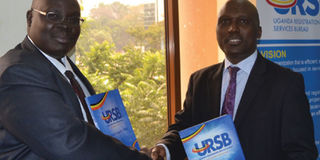Defence, UNRA targeted in foiled Shs81b Central Bank cash thefts

Financial Intelligence Authority executive director Sydney Asubo (L) shakes hands with Mr Bemanya Twebaze, the Registrar General Uganda Registration Services Bureau, after signing a Memorandum of Understanding to share vital information to fight money laundering. FILE PHOTO
Kampala- A cabal of hackers, middlemen and suspected Ugandan bureaucrats has, within 10 months, since last July attempted four times to siphon Shs81 billion through Bank of Uganda (BoU), our investigations show.
All the transactions were foiled, and two of the monies that had successfully been wired abroad were retrieved through inter-bank procedure, the latest being the $8 million (Shs27b) transferred on February 26, 2016.
Highly-placed sources, which declined to be identified for fear of jeopardising ongoing investigations, told this newspaper that accounts targeted are of the largest budget holders, among them, the Defence, Energy and Agriculture ministries as well as the Uganda National Roads Authority (UNRA).
The first attempt and aimed at the biggest amount, according to investigators, happened in July 2015 and $12 million (Shs40b) was targeted.
The plot was foiled, and the masterminds went below the radar, re-emerging in December 2015 to try to steal $2 million (Shs6.7b).
A month later, in January 2016, they made another attempt to fork out Shs8 billion but were detected in time before returning to compromise the system last month.
Although the Ministry of Finance first notified Uganda Police of the breaches 10 months ago, its detectives did not act immediately, prompting the military, whose budget was targeted, to swing into action and arrest three suspects being kept in police custody.
Police spokesperson Fred Enanga earlier said they had picked the trio, but declined to comment when asked why the UPDF had taken over the sensitive inquiries amid allegations that police was compromised.
Military spokesman, Col Paddy Ankunda, could not confirm the arrests when contacted.
Last night, Ministry of Finance spokesman Jim Mugunga said: “This is an ongoing investigation and our expectation is that the security agencies involved are doing their work.”
He was non-committal on the reported past attempts, saying he believes investigators will unearth all breaches.
Sources familiar with the incidents say they believe a complex web of foreign-based IT-savvy individuals aided by bureaucrats with ‘god fathers’ in government who share passwords with them, profile the accounts with huge credits to stage the theft.
All the Integrated Financial Management System transactions, according to our investigations, were originated from the Ministry of Finance and processed through BoU to be wired to accounts of what turned out fictitious companies in either Hong Kong or the United Arab Emirates.
It is unclear how non-existent entities indicated in the documents held accounts, raising suspicion of possible collusion between host banks and the masterminds.
“The matter is the subject of an active investigation, so until that process ends we are not in a position to offer the details you are requesting for,” said BoU communications director Christine Alupo, adding: “Yes, indeed all the funds were recovered from beneficiary banks in the United Arab Emirates and Hong Kong and are back in the custody of the Bank of Uganda.”
The fraud comes three years after government instituted new financial integrity measures introduced to protect public monies as demanded by donors following the 2012 scandal in which technocrats in the Office of the Prime Minister stole in excess of Shs60 billion that development partners had pooled to rebuild war-scarred nothern Uganda.
Ministry of Finance Permanent Secretary Keith Muhakanizi said yesterday that their internal controls are infallible which helped them detect the intended frauds and recover cash already wired abroad.
“We find the IFMS payment system which was instituted highly robust. There will always be fraudsters trying to defraud the system, but at this stage we are comfortable because we have previously had four attempts but they have failed,” he said.
Separately, it emerged yesterday during a workshop organised by the Financial Intelligence Authority (FIA), a new institution set up in 2013, that Uganda has never done national risk assessment and, therefore, remains vulnerable to financial crimes.
Mr Sydney Asubo, the FIA executive director, said the reported breaches at BoU were cases of “fraud”, and not money laundering unless the masterminds had spirited the cash and redeemed it through other sound investments.
Finance Minister Matia Kasaija said if unchecked, frauds, money laundering and terrorism financing could rattle the economy by injecting surplus liquidity, sparking inflation.
“We are aware these criminal activities are taking place in the economy given the vulnerability surrounding the anti-money laundering and financing of terrorism framework such as cash based transactions, porous borders, international trade and conflicts in the Great Lakes region,” he said.




